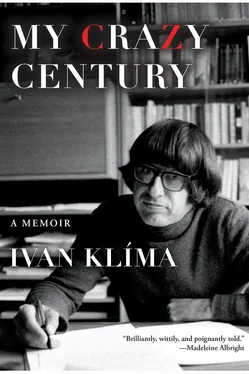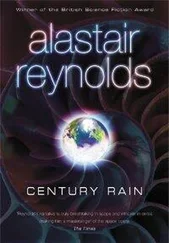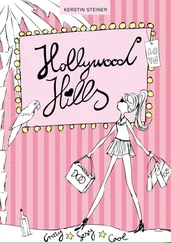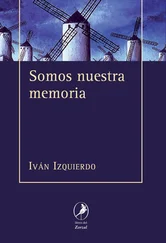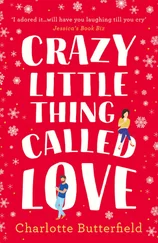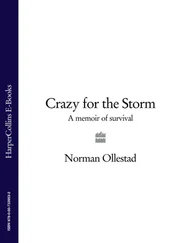The next morning the doorbell buzzed. When Father opened it, five men burst into the apartment. They reminded me of something that had happened a long time ago during the first day of the occupation, when gestapo agents burst into the apartment looking for my uncles. But the gestapo had merely walked through the apartment looking into various possible hiding places, and then they disappeared. These men pulled out some papers, shoved them at Father, and continued to conduct a thorough search of the apartment.
While my panic-stricken mother tried to elicit from them what they were doing, what right they had to dig through our things, my brother was still sleeping, and Father mutely looked on. At that moment, I was thinking about my notebook. If they found it, I would never be able to convince anybody that I’d placed it in my briefcase by mistake and not with the subversive intention of photographing its contents and handing them over to an agent of the CIA.
Occupied with my own paltry problem, I barely noticed the growing pile of documents with Father’s calculations, and specialized books in German, English, French, Russian, and Hungarian. These strange investigators could not make sense of any of it (they knew no foreign languages and had no idea what the documents and books dealt with). Therefore, they found them suspicious. To the pile of books and calculations they added a camera, a projector, and binoculars. We didn’t own anything else of value.
Then one of them walked over to my dresser, opened a drawer, and took out a notebook, which had notes in Russian. This fellow, who belonged to the ancient past as well as the present, asked: Is this yours?
I nodded
Are you a student?
I said I studied Czech.
He took another notebook, opened it, and gave it a good shake. A piece of blotting paper fell to the floor. He let it lie there for a moment but then it occurred to him that it might contain a message. He picked it up and held it against the light.
I didn’t remember how far down the SECRET notebook was, just as he didn’t know what he was supposed to be looking for in my dresser. I said, “That one’s for Russian literature.”
He put the notebook back and closed the drawer. I knew I was saved.
Father, however, was not. They led him away without even letting him say goodbye.
It looked as if a tornado had ripped through our apartment. Books, piles of paper, everything lay all over the chairs, floor, and dining room table. Some things they’d taken away, and the rest they’d just left lying wherever they’d thrown it.
*
Funeral music was playing on the radio at the time when Socialist songs should have been broadcast. Then a voice, tremulous with emotion or pain, announced: The Central Committee of the Communist Party of the Soviet Union, the USSR Council of Ministers, and the Presidium of the USSR Supreme Soviet announce with profound sorrow. .
Yesterday we’d already heard the doctor’s report about J. V. Stalin’s serious illness, so I didn’t have to wait for the end of the announcement. It was clear: Stalin was dead.
The next day, the newspapers’ front pages were bordered in black and bore a youthful picture of the recently deceased. The state newspaper Rudé právo, on the very day of his death (I remember thinking it strange the paper did it so quickly), printed a text, which I cut out because of its remarkable combination of folk song and political phrasing (at the time I didn’t fully understand the duplicity of the content):
When our workers were given to understand this woeful news, they were stricken with boundless grief and wept bitter tears. They wept for the most painful loss that could afflict the Soviet land, the international working class, the working people of all countries, and the entirety of progressive and peace-loving humanity.
Farther on it continued in a decidedly nonlyric tone:
In vain did the imperialist hyenas base their hopes upon the death of the great Stalin. His work is unchallengeable and incontrovertible.
A period of national mourning was proclaimed; flags were lowered to half-mast or exchanged for black funeral banners.
My former love, Tatyana, who had taken a dislike to me, came to see me one day and asked if I had a moment.
We sat on a bench on the top floor of the building where students were waiting to take an exam in the dead languages of the Near East, and, as was her habit, she peered unblinkingly into my eyes. She said she knew how horribly she’d offended me and could imagine how alone I must feel after such a calamity.
I wasn’t sure what calamity she was talking about. At first I thought she’d found out that my father had been arrested, but then she explained: How horrible it is that even the greatest of people must die. She said she also felt alone, completely alone. She placed her head on my shoulder and started crying.
In Literární noviny respected poets were expressing their grief. Milan Jariš lamented:
Each felt the cold in his heart
and the responsibility — we must continue apart
No, there is no one I loved more
than my father who is no more.
Stalin — The strength of the Soviet Union
Stalin — The author of future instruction
Stalin — The life of every future human
Stalin — The one that will destroy destruction.
The weekly newsreel showed the crowds at the funeral. You could hear the oaths of loyalty to his eternal memory, and black crepe seemed to blanket the entire world, which was apparently drowning in tears.
Tatyana confided to me that she’d made a tragic mistake with Tomáš. She had succumbed to the atmosphere there on the Ostrava Brigade. Life, however, is built not from bricks and mortar but from feelings and understanding. And now during these difficult and dismal days, she had realized it.
On the bench, looking out over the embankment and castle arrayed in black, we embraced each other and kissed.
On top of all this, President Gottwald died a few days later.
Once again crowds swarmed the funeral; oaths of loyalty were sworn to the sacred memory of the first workers’ president; there were more black banners and tears. Cinemas and theaters were closed, and the only thing on the radio was funeral music.
We had no news of Father — where he was, what had happened to him, why they had taken him away. We didn’t even know what we were going to live on.
Aunt Hedvika, who always talked about the great Stalin with such enthusiasm, stopped by. She said Father had certainly done nothing wrong, and she offered to contribute at least a little money until he returned. Then my aunt, the one who had lived so many years in the Soviet Union and revered Stalin as a giant among men, said something that astounded me. Vilík is lucky the Leader has died. Maybe everything will change now, and these disgraceful trials will cease.
*
Mother had become desperate. She kept looking out the window as if thinking she would catch sight of Father, who couldn’t be kept in prison, since he hadn’t done anything wrong.
Because she was the sister of national heroes after whom a Prague square had been named, she steeled her resolution and wrote a letter to the new president of the republic. She said she’d known Father from their early student days and was quite certain he’d never done a single dishonest thing in his life. She knew that work meant everything to him, and every day he worked well into the night. She also knew that when he was working in Brno, he was attacked, and only because he’d urged people to do honest work. Such aspersions, however, have no place in our republic.
She racked her brain over every word, even over the closing. She knew she should end with the comradely Honor to Work, but that greeting never passed her lips, so she wrote just With Deep Regards.
Читать дальше
